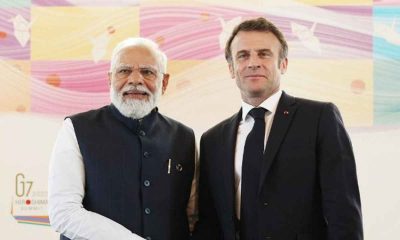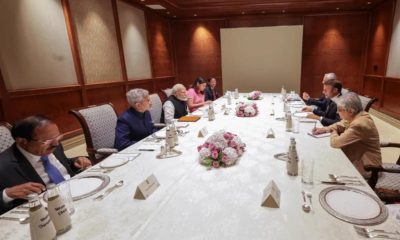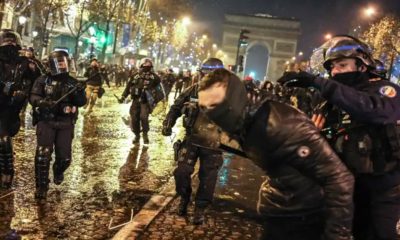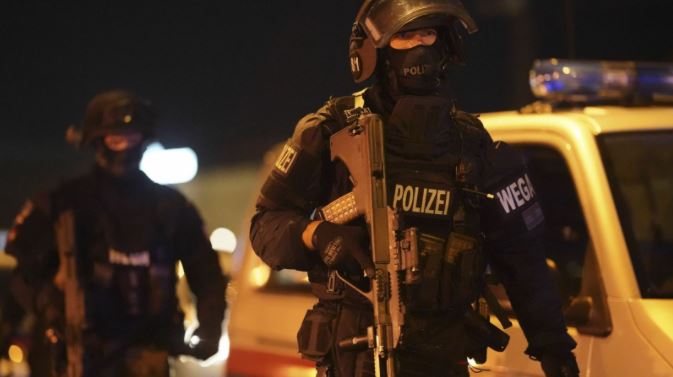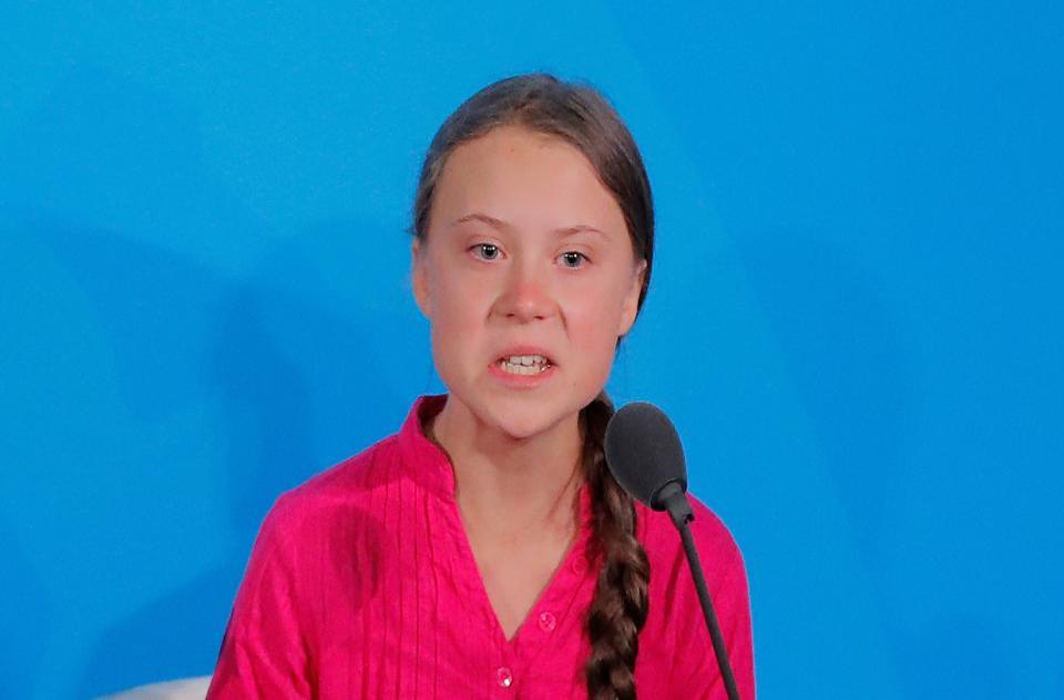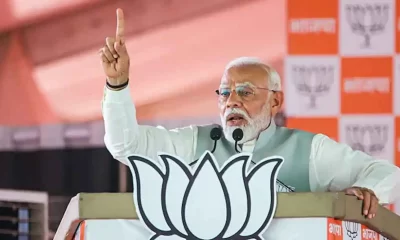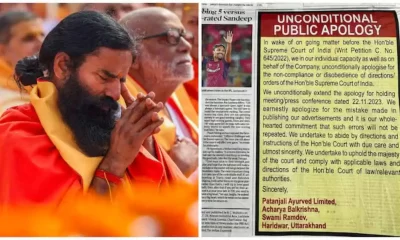Latest world news
French Communist Office: “Does Anyone Live Here Anymore?”

[vc_row][vc_column][vc_column_text]
After supporting Jean-Luc Melenchon in the presidential polls, communists in France have gone their own way in elections to the National Assembly by contesting against him.
By Saeed Naqvi
Imagination conjures up sounds of the organ as I stand in the shadow of that brooding architectural wonder. It feels like I am at a service for the repose of the dead.
I am brought back suddenly, as in an abrupt Bunuel sequence, by a bearded, kindly looking receptionist, directing me almost in slow motion, towards the elevator to the fifth floor where Laurent Perea, from the International Department of the French Communist Party, a tall, burly man, ushers me into a room, which overlooks a terrace with puddles and bird dropping and torn awnings.
Intimations of mortality are not in the DNA of political parties – unlike, human beings. When the great Brazilian architect, Oscar Niemeyer, builder of Brasilia, set about diligently building the iconic headquarters of the Communist Party of France, from 1967 to 1981, he was firmly in possession of the party’s self-esteem. The great Georges Marchais was the party General Secretary towards the end of the architectural enterprise. The nine-floor giant arc, dominates Place du Colonel Fabien, a legendary figure of French resistance against the Nazis. Nearby, to this day surprisingly, is the Stalingrad square.
Faded associations came alive suddenly when the Left candidate Jean-Luc Melenchon, sprinted so fast on the straight that he found himself among the top four candidates. He was a rank outsider. And yet, 600,000 more votes and he would have been among the two candidates for the crucial run-off. French history could have taken a turn.
Well, the cookie crumbled differently. A 39-year-old Emmanuel Macron mostly old wine in a new, opaque bottle, won. He heads a movement, En Marche, March Forward but does not have a party. Come the critical June 10, elections to the 577-member National Assembly, all the defeated parties with residual cadres will rush to help Macron block Marine Le Pen, who does have motivated cadres in the drill for far-right politics.
To use a football image, does Melenchon have to be “marked” in the assembly elections? He is fielding candidates in most of the constituencies. Most people outside France appear not to have registered a cardinal point: the French Communist Party (CPF) is also running helter skelter to field as many candidates as Melenchon.
How have cooperative relations during the presidential election given way to conflict? There are deep differences in interpreting the mandate. Melenchon believes the 19.6 per cent vote he received as presidential candidate should be credited to him. The party places some of the credit at the door of its cadres.
It is a complicated tussle. Let me explain. There are, for instance, 101 “departments” – a department is greater than a district and smaller than a state.
Laurent Perea, who greeted me on the fifth floor, happens to be the Mayor in Dordogne which has four assembly seats. Melenchon insists his influence in Dordogne is paramount and therefore all four seats must go to him. CPF says they should split two seats each. At this level of bickering, talks between Melenchon and CPF collapsed last week.
The appeal of Melenchon, like that of Pablo Iglesias of Podemos in Spain, comes not from having timidly followed some party discipline but for pitching it audaciously for unambiguous change, within the Left framework but innovatively, without being hemmed in by rules.
In the Indian context, if, say Kanhaiya Kumar, the former president of the JNU students’ union, were to break loose from CPI affiliations, he would have the Pablo Iglesias-Melenchon potential. By universal consent, Melenchon is the best speaker in French public life. Kanhaiya Kumar, likewise, has left even right-wing audiences mesmerised by this oratory.
Rather than stride along the straight and narrow, Melenchon projected himself as a friend of the late Hugo Chavez of Venezuela; he incorporates into his rhetoric Cuba, the Bolivarian revolution. While the romance was on, CPF tolerated Melenchon’s Bolivarian flourishes. But today the comrade from Pondicherry, P. Dassardane openly chastises President Maduro’s “dictatorship”. Forgotten are the “machinations of US imperialism” against the Venezuelan revolution.
With this level of hostility between the party and the candidate, even their respective sympathisers are not expecting more than a handful of members in the Assembly.
If Melenchon ends up with respectable double digit figures in the House, it will be to the credit of La France Insoumise or Unbowing France which he launched late last year. The one lakh CPF membership was called into urgent session to consider the critical issue: should CPF support Melenchon? Party secretary-general, Pierre Laurent threw his vote behind Unbowing France. Never did he suspect that it was “Unbowing” Melenchon the party was supporting.
Should Melenchon zoom ahead of the party which once supported him, Pierre Laurent will, from the loneliness of the secretary-general’s room, once occupied by Marchais, contemplate the future of the party and the building.
Mirza Rafi Sauda’s description of a deserted palace, shares the mood of Shelley’s Ozymandias.
Sauda describes a voice echoing through the corridors:
“Does anyone live here anymore?”
[/vc_column_text][/vc_column][/vc_row]
Latest world news
World Earth Day 2024: Google Doodle showcases aerial view of planet’s natural beauty
Google celebrated Earth Day 2024 with a special doodle featuring an aerial view of our planet’s biodiversity.

Google shared a doodle today to celebrate World Earth Day 2024, which showcased aerial photos of the planet’s biodiversity and natural beauty. Google reminded us of the importance of protecting planet earth for future generations with the help of this doodle.
The Google letters depict specific locations across the globe where people, communities, and governments work every day to help protect the planet’s natural beauty, biodiversity, and resources, according to the explanation of the annual Earth Day 2024 doodle on their website.
It said, these examples remind us that there’s much more to do to address the climate crisis and biodiversity loss, but also offer the promise of hope and optimism.
The islands of Turks and Caicos are represented by the letter “G.” The islands’ conservation efforts are concentrated on protecting important regions for biodiversity and addressing persistent environmental problems.
The largest reef in the southern Gulf of Mexico and a UNESCO biosphere reserve, Scorpion Reef National Park, is represented by the letter “O” in the Mexican flag.
The letter “O” features Iceland’s Vatnajokull National Park, which was designated as a national park in 2008 following decades of advocacy. The ecology within and surrounding the biggest glacier in Europe is safeguarded by this UNESCO World Heritage Site.
The letter “G” has the Jau National Park in Brazil on it. It is a UNESCO World Heritage Site and one of the biggest forest reserves in South America.
The Great Green Wall of Nigeria is represented by the letter “L,” and the Pilbara Islands Nature Reserves of Australia are represented by the letter “E.”
Meanwhile, Earth Day is a worldwide event that promotes protection of the environment every year. April 22 serves as a reminder of the importance of conservation efforts and sustainable practices to guarantee a healthier world and a brighter future.
The occasion inspires people across the world to come together and take action to protect the environment, strengthening our bonds with nature and promoting good change.
Latest world news
Bigg Boss 14 contestant Rahul Vaidya struggles walking in knee deep water, compares Dubai rains with Mumbai floods
Singer and TV personality Rahul Vaidya was recently stranded in the Dubai rains.

Rahul Vaidya, who was in Dubai ahead of his show which was scheduled to take place today, left the country due to heavy rains and reached Kolkata. The artist shared on social media his encounters in the UAE city, including challenges like walking through knee-deep water. Rahul provided an update regarding the heavy rainfall in Dubai on his Instagram profile.
The Bigg Boss 14 contestant revealed that he was in Kolkata and prepared to do an evening performance. Recalling the terrifying period he went through, Vaidya said there was a lot of confusion and panic in Dubai. The situation was similar to that when heavy floods hit Mumbai in 2005.
Vaiday also posted seval other images and videos of cars that were underwater and flooded roadways. The Bigg Boss 14 contestant, who shared his ordeal, claimed that even though it had just rained for two hours, the situation was dire.
In one of the video, which went viral he can be seen struggling in walking in knee-deep water. He can be also seen holding his sneakers in one hand and with other hand he was seen managing other things.
This is the result of the two hours of rain that it had, he can be heard saying in the video. Vidya also said he dosen’t believe Dubai is accustomed to a lot of rain. Everything had stopped working, he remarked.
After taking part in the first season of the singing reality show Indian Idol, Rahul Vaidya gained widespread recognition. In addition to Bigg Boss, he took part in Khatron Ke Khiladi 11.
Meanwhile, heavy rains that triggered flooding in the UAE and Bahrain, which left 18 people dead in Oman on Sunday and Monday, have paralyzed the financial hub of the Middle East, Dubai.
A lot of incoming flights were diverted from Dubai’s international airport because of the rain. At 7:26 p.m., the busiest airport in the world for foreign visitors stopped accepting new arrivals; a gradual resumption was announced for more than two hours later.
Images of planes navigating flooded tarmacs are making the rounds on social media.
According to pictures shared on social media, the flagship malls Dubai Mall and Mall of the Emirates both experienced heavy floods, while at least one Dubai Metro station had water up to the ankles.
There were several road collapses, severe flooding in residential areas, and numerous reports of leaks from windows, doors, and roofs.
Due to the unfavourable weather, schools around the United Arab Emirates were forced to close, and as more storms are predicted, the closures are anticipated to last until Wednesday. The government of Dubai allowed its staff to work remotely till this Wednesday.
Latest world news
Dubai sky turns green during storm in UAE, video goes viral
The UAE witnessed record-breaking rainfall on Tuesday and the National Centre of Meteorology recorded 254 mm of rainfall in less than 24 hrs in the Khatm Al Shakla area in Al Ain.

1 person was killed in UAE as it witnessed heavy rainfall on Tuesday, stranding commuters, flooding roads, disrupting trains and flights and resulting in water leakage from mall ceilings. The UAE witnessed record-breaking rainfall on Tuesday and the National Centre of Meteorology recorded 254 mm of rainfall in less than 24 hrs in the Khatm Al Shakla area in Al Ain. It is being said that the rainfall was the highest documented since the start of data collection in 1949.
The heavy rainfall in UAE came days after a similar situation in neighbouring Oman, where 13 people were killed in flash floods. Many parts of Oman saw torrential rains, which caused students to be trapped in buses and swept away motorists and trapped people in their homes.
Videos from Dubai circulating on social media showed widespread waterlogging on roads in Abu Dhabi, Dubai and other important cities. This left daily commuters in cars and other vehicles struggling to get back home. Dubai metro station too was seen flooded and closed.
One such video circulating on social media shows the aerial view of the city of Dubai from the top of a building. In the video the stormy winds are seen blowing over the city of Dubai. As the storm intensifies the Dubai sky turns green and ultimately gets covered by heavy rainfall. The video has gone viral on social media with more than 1.1 million views.
Another video showed water leakage from the ceilings of shopping malls, flooding the floors and destroying goods. A video which was shot in the famous Mall of the Emirates, showed pieces of ceiling falling as the rainwater gushed inside. Videos from many outlets of the Deira City Centre mall chain showed escalators being rendered unusable. Majid Al Futtaim, the company which owns the Mall of Emirates, said that the shopping complexes have been kept open and the customers are being sent away from the flooded areas.
-

 Entertainment23 hours ago
Entertainment23 hours agoManisha Koirala reveals reason for rejecting Dil To Pagal Hai, says regrets that decision
-
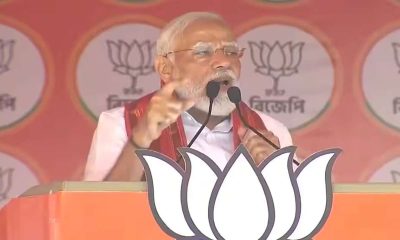
 2024 Lok Sabha Elections22 hours ago
2024 Lok Sabha Elections22 hours agoPM Modi says Congress leaders consider themselves above Lord Ram
-
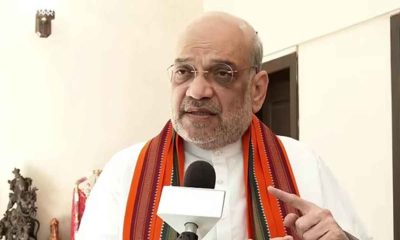
 2024 Lok Sabha Elections24 hours ago
2024 Lok Sabha Elections24 hours agoAmit Shah says neither Congress nor Trinamool chief Mamata Banerjee can interfere with CAA
-

 Trending22 hours ago
Trending22 hours agoDolly Chaiwala sips coffee atop Burj Khalifa, video goes viral
-

 Trending21 hours ago
Trending21 hours agoNexon owner replaces broken side mirror with a plastic mirror, social media users say epic moment
-
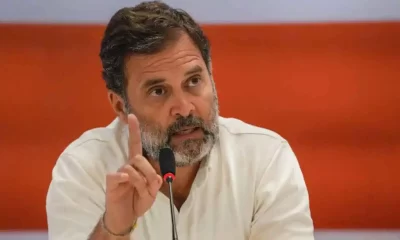
 2024 Lok Sabha Elections4 hours ago
2024 Lok Sabha Elections4 hours agoRahul Gandhi clarifies on wealth survey remark, says aim is to identify injustice
-
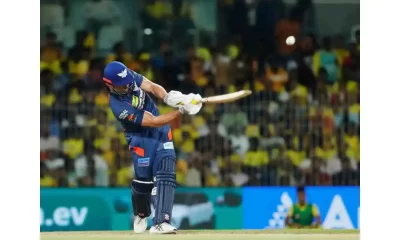
 Cricket news5 hours ago
Cricket news5 hours agoIPL 2024: Marcus Stoinis hits first IPL century as Lucknow Super Giants beat Chennai Super Kings by 6 wickets
-
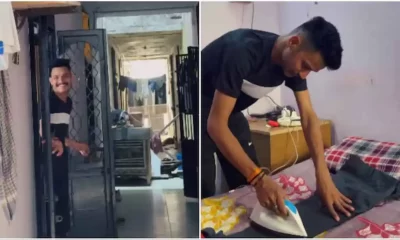
 Trending2 hours ago
Trending2 hours agoA waiter’s life: Social media users go emotional on watching viral video

